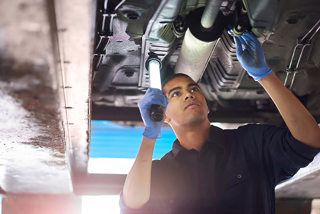Unscrupulous commercial vehicle operators looking to cheat emissions regulations by installing AdBlue emulators have been told by the senior traffic commissioner to desist or face losing their O-licence.
AdBlue has risen to prominence following the introduction of Euro V in 2008. This required the majority of truck manufacturers to employ exhaust gas recirculation (EGR) and selective catalytic reduction (SCR) systems to hit more stringent CO2 emissions targets. It is also a key component for Euro VI trucks.
SCR requires the use of diesel exhaust fluid (DEF), of which AdBlue is the best known, to ensure the emissions standard is maintained throughout the operation of the truck.
Key to maintaining the legal low emission level is ensuring there is sufficient AdBlue fluid in the tank.
This is monitored by the truck’s electronics system receiving a signal from one of the on-board sensors. When the fluid starts to run low there are visual and audible warning indicators to alert the driver.
Ultimately, should the AdBlue tank run empty, the truck’s performance will be impaired until the situation is rectified.
The emulator is an electronic device fitted between the AdBlue tank and the on-board ECU which fools the system into thinking the tank remains full.
It is possible, though not compliant, to run a truck with no AdBlue present. The “performance impairment” mainly serves as a reminder to those who wish to operate within the emissions guidelines.
A quick internet search reveals a plethora of sites selling these devices. It is not illegal to sell AdBlue emulators in the UK but, in certain circumstances, it is illegal to use them – particularly when you are using them to falsely represent the presence of AdBlue in the vehicle’s tanks.
There are legal uses, however. If part of a truck’s route involves travel outside the EU, that part of the journey can be driven with the emulator on, saving AdBlue. Also, AdBlue can freeze in especially cold climates. Again, the emulator can stop the truck’s performance being impacted.
The temptation to use emulators has proved too strong for some UK operators. The DVSA has picked up numerous uses of the devices during random checks, with one main reason for their illegal use – cost-saving.
For example, in London, there are considerable financial gains when operating lower emission level vehicles. Using an emulator within the Transport for London Low Emission Zone (LEZ) boundary could save thousands of pounds.
This issue was highlighted by Kevin Rooney, traffic commissioner for the West of England, in a public inquiry involving Stephen Harris and Karen Phelps at hauliers KSL, where an AdBlue emulator had been discovered.
Rooney made an order to revoke a six-vehicle licence held by the pair, after rejecting Harris’s claim that he didn’t know one of his vehicles was fitted with an emulation device.
The regulator said the emulator returned the Euro VI vehicle’s NOx emissions to Euro III standard, increasing emissions by potentially 2.5 times the official level.
Rooney said: “With the emulator fitted and operating at Euro III levels, the operator should have paid a pollution charge of £200 per visit to the capital.”
Rooney warned commercial transport operators that they face enforcement action if they use devices designed to cheat emissions control systems.
Savings are not limited to avoiding local authority levies.
Using the industry ratio of AdBlue to diesel usage of 1:20 and a price varying from 99p per litre to 30p per litre for bulk purchases, a truck travelling an average 80,000 miles a year over five years would use up £2,500 in AdBlue.
The DVSA is well aware of AdBlue emulators and checking for their presence is now part of the routine vehicle inspection process both at the roadside and in the workshop.
Richard Turfitt, senior traffic commissioner, said: “We welcome the steps being taken by the enforcement agency to identify emissions cheats. Use of these devices threatens to undercut responsible and compliant operators as well as damaging the environment and public health.
"Traffic commissioners will look to take action wherever an operator seeks an unfair and illegal advantage over the rest of industry.”
His view is supported by the Freight Transport Association. James Firth, its head of licensing policy and compliance, said: “Manufacturers and responsible operators have made significant investments to ensure commercial vehicle fleets continue to be as clean as possible.
"It is important this excellent work is not undermined by the perception that emission control manipulation is widespread. It isn’t.”



















Login to comment
Comments
No comments have been made yet.